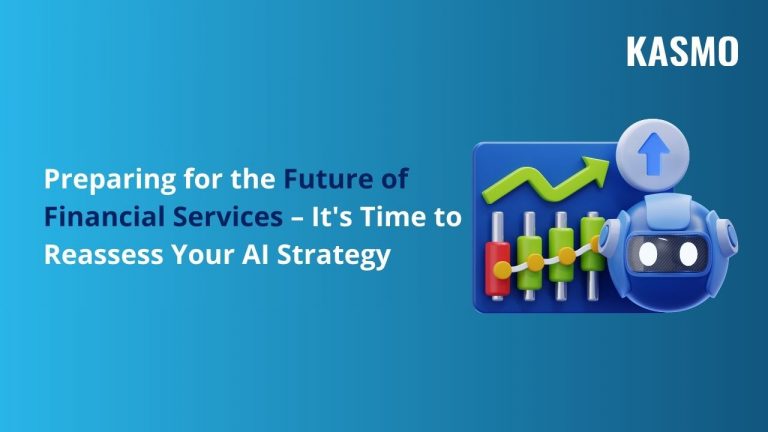Introduction
According to a survey conducted by Goldman Sachs in 2024, the probability of obtaining benefits from Gen AI will inspire more companies to invest an estimate of $1Tn in the upcoming years. Financial services firms are also looking forward to utilizing the power of Gen AI and other advanced technologies. However, implementing Gen AI is not enough. To transform the future of financial services, it is crucial for financial leaders to understand how they can utilize Gen AI along with their data to get the maximum benefits.
In this blog, we explore how AI is reshaping the future of financial services and what benefits it can bring for financial services firms and their customers.
How AI is Transforming the Future of Financial Services?
Let’s look at some of the important ways that AI is transforming the future of financial services:
Accelerating Efficiency with AI-Powered Automation
AI for enterprises is significantly enhancing efficiency. One of the most impactful areas is in Business intelligence (BI). Financial institutions deal with vast amounts of data that need to be processed, analyzed, and acted upon quickly. AI-powered systems and enterprise AI solutions, such as large language models (LLMs), are empowering financial professionals to query data using natural language and receive intelligent, context-rich responses.
This can help portfolio managers, analysts, and executives make faster, more informed decisions, reducing the time spent on manual tasks like data sorting and report generation.
Explore OLAF – our accelerator that is built specifically for financial services firms. Connect with us if you are looking forward to tailoring it according to your business needs.
Enhancing Customer Experience with Conversational AI
AI in the enterprise is also revolutionizing the customer experience in financial services. Conversational AI, such as chatbots and virtual assistants, is becoming increasingly prevalent. These AI-powered assistants can engage with customers in natural language, offering personalized recommendations, answering queries, and even processing transactions. This makes customer service more accessible and efficient, as customers can interact with AI systems 24/7.
As AI tools become more sophisticated, financial institutions can offer more tailored, interactive experiences to their customers. For example, customers can query their account balances, request financial advice, or even inquire about new investment opportunities—all through a conversational interface.
This kind of AI-powered assistance is not just for external clients; it’s also streamlining operations internally as well. Employees in non-technical roles can interact with data through intuitive, user-friendly interfaces, making it easier to access insights without needing advanced data analytics skills.
Optimizing Risk Management with AI-Driven Insights
To fully transform and elevate the future of financial services, improving risk management is crucial. From underwriting insurance policies to managing credit risk in lending, if your company is still using traditional risk models, then you might not be able to fulfill your customers’ queries and streamline operations on time.
Using these traditional risk models will have you rely on manual processes and rigid data sets, that can be an inconvenience for your business in the longer run. However, if you are switching to AI models, you can analyze vast amounts of unstructured data—such as customer interactions, transaction histories, and even news articles or social media posts—helping you uncover hidden risks and opportunities.
AI can assist financial services firms in predictive analytics, helping employees identify trends, assess potential risks, and recommend actions before issues escalate. For example, leveraging AI algorithms you can analyze market conditions, customer behavior, and historical data to identify high-risk loans, potential fraud, or market volatility, giving financial firms a proactive edge in managing risk.
By leveraging AI, organizations can build more agile risk models that continuously evolve with changing market conditions and customer behaviors, ensuring better compliance, more accurate forecasts, and faster reaction times.
Transforming Data Management and Governance
One of the primary hurdles in adopting AI in financial services is data management. Financial services firms need to handle massive amounts of structured and unstructured data, ranging from financial records to customer communications. AI is playing a pivotal role in helping financial services to modernize data strategies by automating data ingestion, transformation, and analysis, ensuring data is accessible and actionable at scale.
These massive amounts of data often lead to financial services firms struggling with data silos, where data is locked in separate systems across departments. With AI, financial leaders can break down these silos and unify data from various sources, allowing them to access a single source of truth. This unified approach improves collaboration between teams, enhances decision-making, and helps ensure that data remains consistent, accurate, and secure across the enterprise.
Additionally, AI is also helping improve data governance which is transforming the future of financial services. In highly regulated sectors like finance, maintaining compliance with data privacy and security regulations is critical. AI-driven systems can monitor data usage, detect anomalies, and alert organizations to potential violations in real-time, enhancing security and regulatory compliance.
Improving Operational Efficiency in Insurance and Claims Processing
Along with transforming the future of financial services, Gen AI is also changing how the insurance sector operates. Without AI, claims processing is time-consuming and labor-intensive. With AI, insurance companies can streamline claims management by using text processing and summarization tools to quickly analyze and extract key information from unstructured documents like policy contracts, claims notes, and customer communications.
For instance, AI tools can automatically categorize data, extract relevant fields, and match claims with corresponding policies, drastically reducing the time it takes to assess a claim. This leads to faster customer service, reduces operational costs, and improves overall customer satisfaction.
Creating New Revenue Streams and Business Models
Beyond optimizing existing processes, Gen AI can also enable financial institutions to innovate and create new revenue streams. By integrating generative AI into their operations, financial services firms can unlock new business models and data-driven products.
For example, financial firms can offer personalized investment advice or create custom financial products powered by AI, driving new sources of revenue and strengthening customer loyalty.
Additionally, the ability to monetize data is another opportunity created by AI. Financial institutions can leverage their own data, as well as third-party data, to offer new insights and services. Platforms like Snowflake Marketplace enable firms to purchase and sell data, offering new opportunities to generate income while enhancing their existing services.
Why Should You Invest in Gen AI to Transform the Future of Financial Services
As predicted by Statista, the direction which the financial sector is investing on AI is expected to exponentially increase from 35 billion U.S. dollars in 2023 to 97 billion U.S. dollars in 2027. As AI adoption scales, you will need to ensure that your existing systems are both cost-effective and secure. This will help you to provide transparency and governance across all data and AI applications.
To gain the confidence of customers and regulators, financial institutions must ensure that their AI models are accurate, bias-free, and auditable. Governance and security controls must be in place to prevent data leaks, maintain privacy, and ensure compliance with industry regulations.
As AI tools become more accessible, you must make it easy for your teams to integrate AI into their workflows. By providing intuitive, user-friendly interfaces and seamless integrations, firms can enable their employees to leverage AI without the need for deep technical expertise, democratizing access to these powerful tools across the organization.
What Role Does Snowflake Play in Transforming the Future of Financial Services?
Snowflake, a leading AI Data Cloud platform, is continuously revolutionizing how financial services firms operate, innovate, and compete. Its ability to break down data silos, enable seamless collaboration, and harness the power of AI is helping to reshape the future of financial services, making them more agile, data-driven, and customer-centric.
By leveraging Snowflake, financial leaders can simplify data architectures and analyze all different kinds of data and create a single source of truth. This integration is crucial for ensuring a seamless, scalable, and secure data collaboration environment that empowers banks, insurers, asset managers, and payment providers to innovate and streamline operations.
You can also combine internal datasets with external data from third-party sources into a connected and secure data ecosystem with Snowflake. This integrated ecosystem enables you to get more accurate and actionable insights, leading to better business decision-making and enhanced customer experiences.
One of Snowflake’s standout features is its ability to enable predictive analytics, which is transforming how financial services interact with customers. You can leverage machine learning models to deliver personalized experiences, improving customer satisfaction and increasing lifetime value.
Risk management is another key area where Snowflake plays a critical role in transforming the financial services industry. By combining data across organizations, Snowflake helps to mitigate financial and reputational risks related to fraud, regulatory compliance, and data security.
Moreover, Snowflake’s advanced data governance features ensure that financial organizations maintain compliance and security. This data cloud platform is designed to safeguard sensitive data, ensuring that financial firms can collaborate securely across business lines, without compromising compliance or customer privacy.
Insurance underwriting has traditionally been a data-intensive and resource-heavy process. Snowflake enables insurers to streamline underwriting by bringing together relevant data from multiple sources, including policyholder history, claims records, and external third-party data. This ability to create a single source of truth allows for more accurate risk assessments and pricing models.
Conclusion
AI is rapidly transforming the future of financial services, by unlocking new efficiencies, enhancing customer experiences, and reshaping business models. From enabling you to take better risk management strategies to creating better claims processing system now easily utilize the full potential of AI and drive a positive change. As organizations continue to invest in AI-powered technologies and refine strategies, AI is set to become an important resource and not just a tool – driving innovation and competitive advantage for your business.
As we look to the future, it’s clear that AI will change how financial services operate and how they interact with customers and deliver value. For financial firms that can harness the full potential of AI, the rewards will be vast: faster decision-making, reduction in overhead costs, improved customer satisfaction, and new opportunities for growth and revenue generation.
Let Kasmo become your partner to help you leverage and utilize the maximum potential of Snowflake and contribute a significant impact in your financial services firms.






